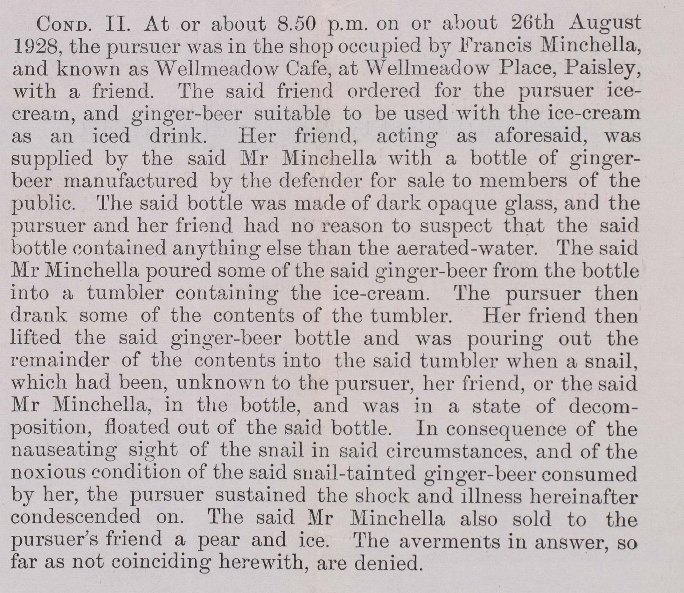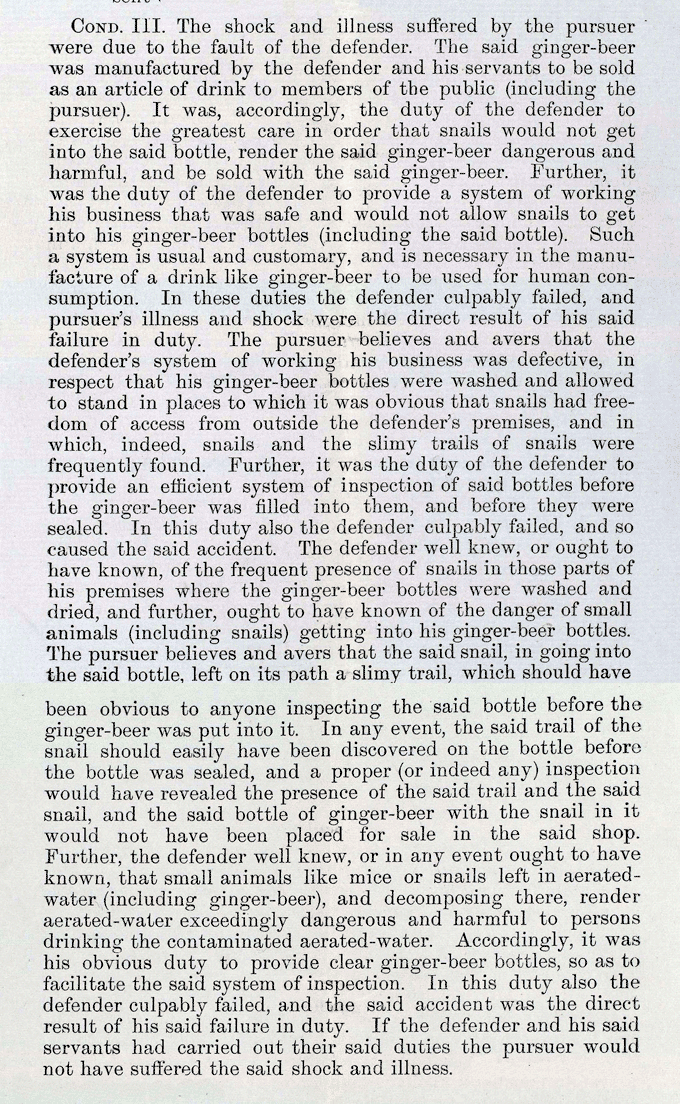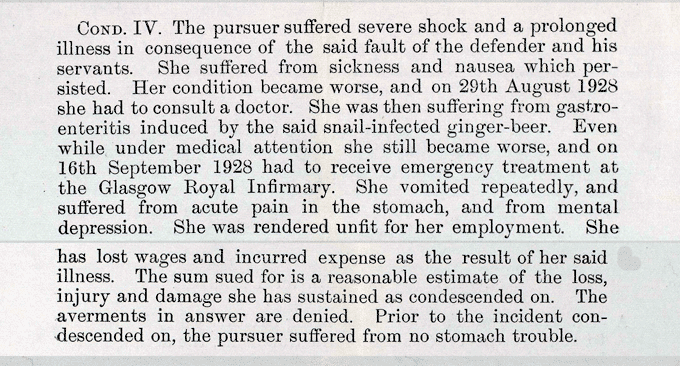| | Home | Resources | Schools Programme | Teachers | Site help | About us | Contact us | |
| You are here: Home > Resources > The Claimant's Case |
The Claimant's CaseMay Donoghue wished to claim compensation from Francis Minghella and David Stevenson for the shock and ill-health that she suffered in consequence of having drunk ginger beer which had been contaminated by a dead snail. The café owner was called Francis Minchella throughout the Court of Session papers - despite the fact that his name was actually Minghella. Early on in the proceedings it was agreed that Francis Minghella had sold the ginger beer in good faith and could have had no idea that the drink was in any way sub-standard. His name was therefore removed from the proceedings and May Donoghue ordered to pay the costs Francis had incurred in defending himself. David Stevenson however had manufactured and bottled the ginger beer and could therefore be held responsible for allowing a snail to get into the bottle. May is referred to as ‘the pursuer’ as she is pursuing the defender (David Stevenson, the manufacturer of the ginger-beer) in her claim for compensation. The allegations against David Stevenson were detailed in the series of condescendences in the Court of Session records which are set out below, with David Stevenson’s answers to each complaint. | |||
Condescendence I
TranscriptCond[escendence] I. The pursuer is employed as a shop assistant, and resides at 49 Kent Street, off London Road, Glasgow. The defender is an aerated-water manufacturer, and carries on business at Glen Lane, Paisley. Answer 1
TranscriptAns[wer] 1. The description of the defender is admitted. Quoad ultra not known and not admitted. Notes: Quoad ultra is a Latin phrase usually translated as ‘everything else’. It should only be used in conjunction with the word ‘denied’. The phrase ‘Quoad ultra denied’ is a 'catch all' phrase to ensure that no accusations are left unanswered. (National Records of Scotland reference: CS252/2299) | |||
Condescendence II
TranscriptCOND[ESCENDENCE] II. At or about 8.50pm on or about 26th August 1928, the pursuer was in the shop occupied by Francis Minchella, and known as Wellmeadow Café, at Wellmeadow Place, Paisley, with a friend. The said friend ordered for the pursuer ice-cream and ginger-beer suitable to be used with the ice-cream as an iced drink. Her friend, acting as aforesaid, was supplied by the said Mr Minchella with a bottle of ginger-beer manufactured by the defender for sale to members of the public. The said bottle was made of dark opaque glass, and the pursuer and her friend had no reason to suspect that the said bottle contained anything else than the aerated-water. The said Mr Minchella poured some of the said ginger-beer from the bottle into a tumbler containing the ice-cream. The pursuer then drank some of the contents of the tumbler. Her friend then lifted the said ginger-beer bottle and was pouring out the remainder of the contents into the said tumbler when a snail which had been, unknown to the pursuer, her friend, or the said Mr Minchella, in the bottle, and was in a state of decomposition, floated out of the said bottle. In consequence of the nauseating sight of the snail in said circumstances, and of the noxious condition of the said snail-tainted ginger-beer consumed by her, the pursuer sustained the shock and illness hereinafter condescended on. The said Mr Minchella also sold to the pursuer’s friend a pear and ice. The averments in answer, so far as not coinciding herewith, are denied. Note: Answer 2
TranscriptAns[wer] 2. Denied that any bottle of ginger-beer manufactured by the defender contained a snail. Quoad ultra not known and not admitted. Any illness which the pursuer suffered was not due to her having partaken of the contents of a bottle of ginger-beer manufactured and sent out from the defender's factory. (National Records of Scotland reference: CS252/2299) |
|||
Condescendence III
Transcript:COND[ESCENDENCE] III. The shock and illness suffered by the pursuer were due to the fault of the defender. The said ginger-beer was manufactured by the defender and his servants to be sold as an article of drink to members of the public (including the pursuer). It was, accordingly, the duty of the defender to exercise the greatest care in order that snails would not get into the said bottle, render the said ginger-beer dangerous and harmful, and be sold with the said ginger-beer. Further, it was the duty of the defender to provide a system of working his business that was safe and would not allow snails to get into his ginger-beer bottles (including the said bottle). Such a system is usual and customary, and is necessary in the manufacture of a drink like ginger-beer to be used for human consumption. In these duties the defender culpably failed, and pursuer’s illness and shock were the direct result of his said failure in duty. The pursuer believes and avers that the defender’s system of working his business was defective, in respect that his ginger-beer bottles were washed and allowed to stand in places to which it was obvious that snails had freedom of access from outside the defender’s premises, and in which, indeed, snails and the slimy trails of snails were frequently found. Further, it was the duty of the defender to provide an efficient system of inspection of said bottles before the ginger-beer was filled into them, and before they were sealed. In this duty also the defender culpably failed, and so caused the said accident. The defender well knew, or ought to have known, of the frequent presence of snails in those parts of his premises where the ginger-beer bottles were washed and dried, and further, ought to have known of the danger of small animals (including snails) getting into his ginger-beer bottles. The pursuer believes and avers that the said snail, in going into the said bottle, left on its path a slimy trail, which should have been obvious to anyone inspecting the said bottle before the ginger-beer was out into it. In any event, the said trail of the snail should easily have been discovered on the bottle before the bottle was sealed, and a proper (or indeed any) inspection would have revealed the presence of the said trail and the said snail, and the said bottle of ginger-beer with the snail in it would not have been placed for sale in the said shop. Further, the defender well knew, or in any event ought to have known, that small animals like mice and snails left in aerated-water (including ginger-beer), and decomposing there, render aerated-water exceedingly dangerous and harmful to persons drinking the contaminated aerated-water. Accordingly, it was his obvious duty to provide clear ginger-beer bottles, so as to facilitate the said system of inspection. In this duty also the defender culpably failed, and the said accident was the direct result of his said failure in duty. If the defender and his said servants had carried out their said duties the pursuer would not have suffered the said shock and illness. Answer 3
Transcript:Ans[wer] 3. Denied. Explained that the system employed at the defender’s factory is the best known in the trade, and no bottle of ginger-beer has ever passed out of there-from containing a snail. The defender exercised every care in the carrying out of that system, and every stage of the processes are and have been properly executed by the defender’s servants. (National Records of Scotland reference: CS252/2299) | |||
Condescendence IV
Transcript:COND[ESCENDENCE] IV. The pursuer suffered severe shock and a prolonged illness in consequence of the said fault of the defender and his servants. She suffered from sickness and nausea which persisted. Her condition became worse, and on 29th August 1928 she had to consult a doctor. She was then suffering from gastro-enteritis induced by the said snail-infected ginger-beer. Even while under medical attention she still became worse, and on 16th September 1928 had to receive emergency treatment at the Glasgow Royal Infirmary. She vomited repeatedly, and suffered from acute pain in the stomach, and from mental depression. She was rendered unfit for her employment. She has lost wages and incurred expense as the result of her said illness. The sum sued for is a reasonable estimate of the loss, injury and damage she has sustained as condescended on. The averments in answer are denied. Prior to the incident condescended on, the pursuer suffered from no stomach trouble. Answer 4
Transcript:Ans[wer] 4. Not known and not admitted. Explained that the alleged injuries are grossly exaggerated. Explained further that any illness suffered by the pursuer on and after 26th August 1928 was due to the bad condition of her own health at that time. (National Records of Scotland reference: CS252/2299) |
|
|